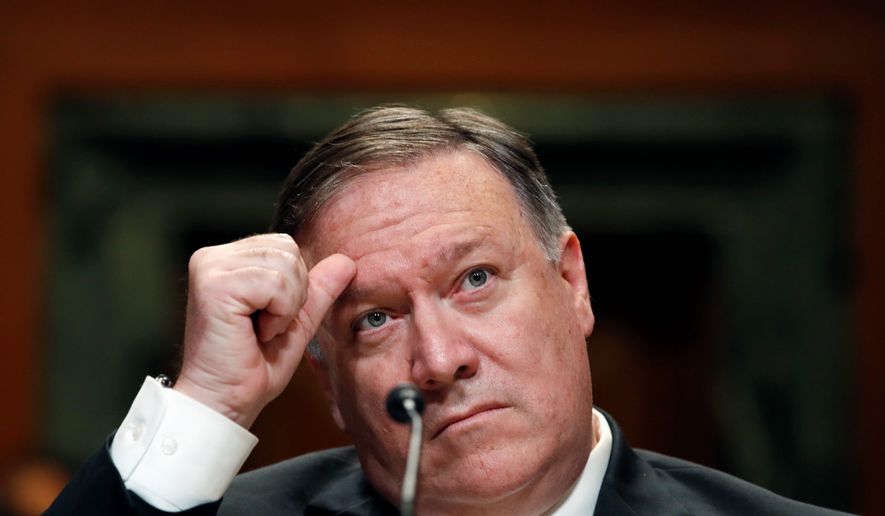Secretary of State Mike Pompeo told a Senate hearing Wednesday that the Trump administration is not going easy on Russia, even as the White House was confirming President Trump and Russian President Vladimir Putin will soon meet for their first face-to-face summit despite a host of irritations in the bilateral relationship.
The Senate Appropriations subcommittee hearing, ostensibly devoted to the budget for State Department and foreign aid programs, ranged over a wide variety of topics, from the outreach to North Korea to the need for Syrian President Bashar Assad to step down in any permanent peace deal.
Lawmakers of both parties had complained that the budgets submitted under former Secretary of State Rex W. Tillerson shortchanged a number of critical programs. The 2019 budget proposal Mr. Pompeo outlined Wednesday set four priorities: protecting America’s security at home and abroad; renewing America’s competitive economic advantage; promoting American leadership; and ensuring effectiveness and accountability to the American taxpayer.
Mr. Pompeo defended the administration’s overall approach to Russia, which Mr. Trump recently suggested should be allowed to rejoin the Group of Seven industrial powers.
“The president deeply believes that having Russia be part of these important geostrategic conversations is inevitable, and there’s a long history of that,” Mr. Pompeo said.
Lawmakers pressed Mr. Pompeo to confirm the threat still posed by North Korea’s nuclear programs, with Democrats such as Sen. Chris Van Hollen of Maryland questioning President Trump’s recent claim via Twitter that his summit with North Korean leader Kim Jong-un meant Pyongyang was “no longer a nuclear threat.”
Mr. Pompeo responded that Mr. Trump’s point was that the threat has clearly been reduced in the aftermath of the Singapore summit, and did not mean to imply that it had completely eliminated.
“We took the tension level down,” he said.
But Mr. Pompeo pushed back against complaints that the Singapore agreement was vague and that Washington and Pyongyang had failed to set a clear path on how the ensuing diplomacy will go, and whether the North will have to give up its nuclear arsenal and missile programs.
“The North Koreans understand the scope of the request that we’re making with respect to denuclearization and the elements that would be required,” he told the hearing. “We have been pretty unambiguous in our conversations about what we mean when we say complete denuclearization.”
On China, Mr. Pompeo said that the U.S. goal is to position itself to countries in the region and the world as a much better ally and partner than Beijing. While saying China has publicly backed the U.S. demand for North Korean denuclearization, U.S. officials have seen some loosening of the rigor with which China is enforcing economic sanctions against Pyongyang.
Clarifying another presidential statement, Mr. Pompeo told lawmakers that no American soldier remains from the Korean War have yet been returned to U.S. custody — a major achievement of the Singapore summit — but that North Korean leaders have indicated that process is underway.
Democrats used the budget hearing as vehicle to criticize a broad array of Trump administration policies and practices. At one point, Sen. Chris Murphy, Connecticut Democrat, displayed a chart he had made which purported to list all the “Trump’s Insults” leveled at foreign leaders.
Mr. Pompeo defended his boss, at one point arguing that stories of tensions with Europe were overstated. While there were tensions with such countries as France, Britain and Germany, there were many other countries in Europe where Mr. Trump and U.S. policies have been praised.
Democrats criticized the administration’s proposed budget cuts to the State Department and aid programs, noting Congress has consistently approved more money than Mr. Trump has requested.
“It could be said that we are here to try to save you from your own administration, and to protect the funding for diplomacy and development,” Sen. Patrick Leahy, Vermont Democrat, told Mr. Pompeo. “We want the people at the State Department and USAID to have the resources they need to do their jobs.”




Please read our comment policy before commenting.